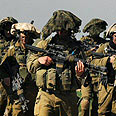
'Values much harder to rehabilitate'
צילום: איי אף פי
Army needs reeducation
Deteriorating IDF values more worrisome than technical aspects of poor performance
This is the most depressing document ever written about the IDF, or more accurately, about the ground forces.
The Winograd Commission stripped the 2006 IDF naked and fully exposed its weakness and shame. The Air Force was praised in the report, the Intelligence Branch received positive mentions, and even the Navy, with the exception of the missile boat that was hit by a rocket, functioned properly. Yet the IDF’s core, the ground forces and the General Staff, reached the Second Lebanon War completely destabilized.
Perhaps it was a good thing that the report did not mention any names, because if it had done so, it would be necessary to fill a whole book with the names of the people responsible for the IDF’s deterioration in the years before the war – both among the military leadership and among the political leadership.
A first cursory reading of the report shows that it emphasized the failed manner in which the army managed the war. The General Staff is presented like a bunch of yes-men who preferred to tow the line and not speak out even if they had something to say. This group found it difficult to conduct itself properly or issue proper orders; it lacked strategic vision, administrative cooperation between the General Staff and the Northern Command was inadequate, there were no orderly assessment processes, and the army chief’s role vis-à-vis the Northern command was unclear.
Moreover, personal tensions emerged while an overabundance of orders and documents created a flood, and at times even wrong interpretations. And the list goes on and on.
Any aspect of the General Staff which the commission examined came out awful. There is good reason why the commission wrote that this group was not even able to decide whether it was facing a war or an expanded version of the regular security routine.
The very same picture repeated in the Northern Command and to a large extent in the divisions as well. They too reached the war unprepared. The units that operated in the framework of the Northern Command did not carry out most of the missions they were tasked with, the commission ruled. It turns out that personal tensions emerged not only between the army chief and the Northern Command chief, but also between the Northern Command Chief and his division commanders.
And when the management of the war is so awful on all levels, there is no wonder that the war’s results are awful. Or as the report noted, the IDF failed and did not achieve the required and possible military achievement. One of the conclusions is that all those officers who decided to end their military career in the wake of the war were not wrong to do so.
Repair job will take many years
Yet the commission did not make do with criticizing the way the war was managed. It examined the IDF’s gut, the spirit of the forces, and discovered a severe moral illness; damaged IDF fundamentals, which for years gave it its true strength. The commission discovered a deep crisis in values such as operational discipline, determination in carrying out the mission, combat leadership, aspiration for victory, personal example, and taking responsibility. The section about personal example, for instance, criticizes division commanders who managed the fighting from within Israel, far away from the border.War management can be fixed within a few years through training, exercises, and acquisitions. Yet the army’s values are much harder to rehabilitate. This is a fundamental repair job that will take many years.
The Lebanon war created a rift between the IDF and Israeli society, the report says. Declarations and a public relations effort will not be enough. What is needed here is genuine, in depth repair effort. Army Chief Gabi Ashkenazi is not only dealing with professionally training the ground forces these days. He is actually dealing with “reeducation.”
The gap between the way the ground forces should have looked and the way they did look in practice in the summer of 2006 is much larger than we thought. Commission members themselves use the term “we were surprised to discover” on more than one occasion. They were not the only ones to be surprised.
It was not Hizbullah that won the war. We failed ourselves. Perhaps this is what the commission meant when it talked about a missed opportunity.










